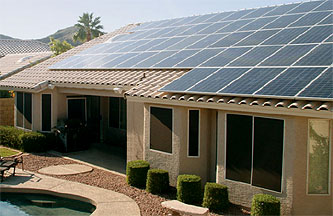My homeowners association would go ballistic if I tried to install solar panels on my roof, but if you live in a less benighted area it’s an attractive option. The problem is that the upfront cost is too  high for some people, and if you take out a conventional loan you run the risk having to keep making payments even if you sell your house. One option is an outfit like SolarCity, which leases the installation for a set monthly cost. If you sell the house, the lease goes with it, so your risk is minimal. Brad Plumer passes along news of another alternative:
high for some people, and if you take out a conventional loan you run the risk having to keep making payments even if you sell your house. One option is an outfit like SolarCity, which leases the installation for a set monthly cost. If you sell the house, the lease goes with it, so your risk is minimal. Brad Plumer passes along news of another alternative:
Two years ago, however, the city of Berkeley figured out an easy financing trick to get around this problem — the city itself just issues a bond to pay for the upfront costs of installing the panels, and the homeowner then repays the government over the course of 20 years via a small line item on the property-tax bill. (This way, if the home is sold, the costs of the panels get passed on to the new owner getting the benefits.)
It’s a small policy tweak, but quite sensible. No mandates, no regulations, just offering homeowners an extra option if they choose. So it’s not surprising to hear that, as Kate Galbraith reports today, the idea’s been proliferating like crazy: This year alone, eight states have followed California’s lead by giving their municipalities permission for this sort of financing, including Colorado, New Mexico, Ohio, Oklahoma, Texas, Vermont, Virginia, Wisconsin. (Apparently, a lot of cities need permission from the states before they can mess with property-tax bills.)
Another benefit of this is that cities can generally borrow at lower rates than private homeowners, so the economics of the panels work out better. It makes a lot of sense, especially in sunny areas like California and the southwest.
UPDATE:










